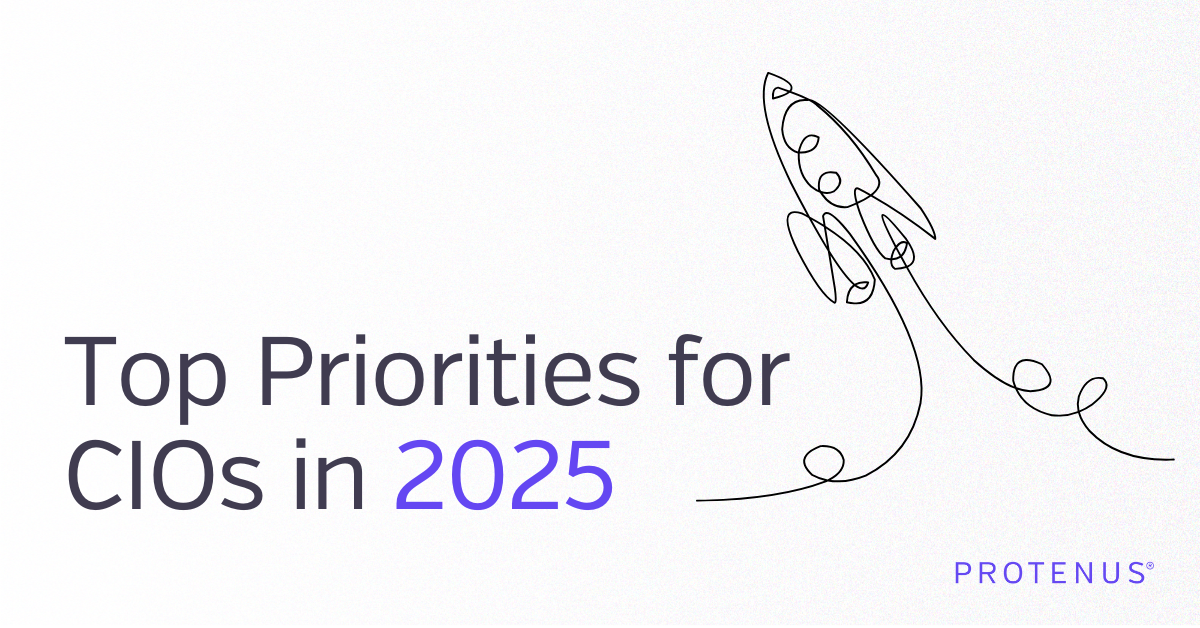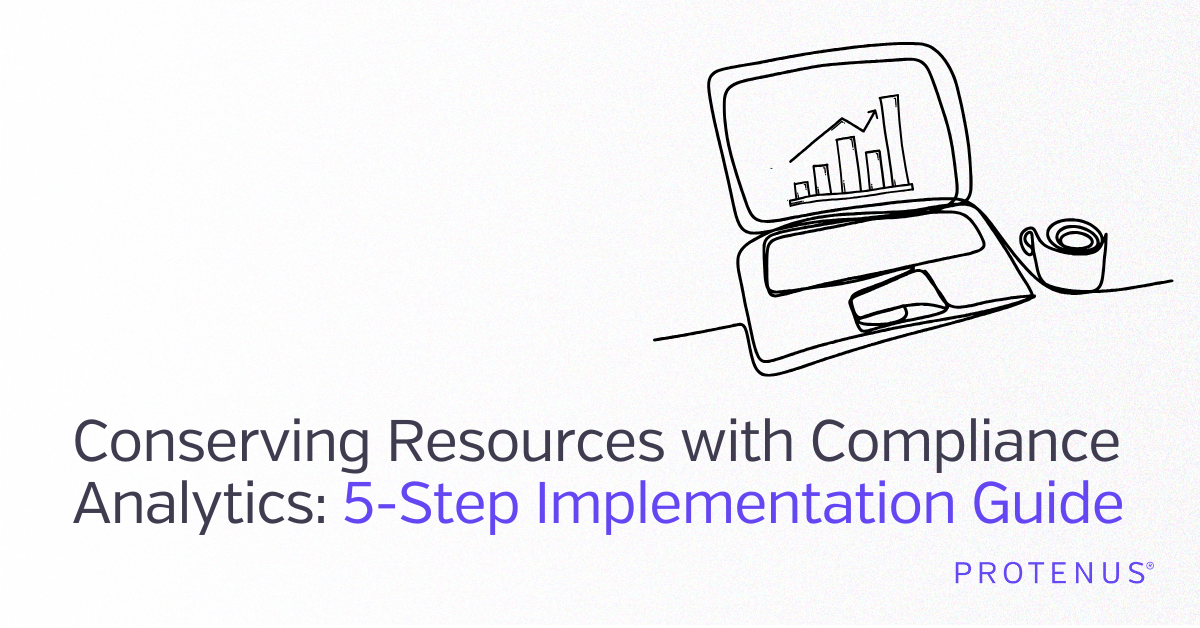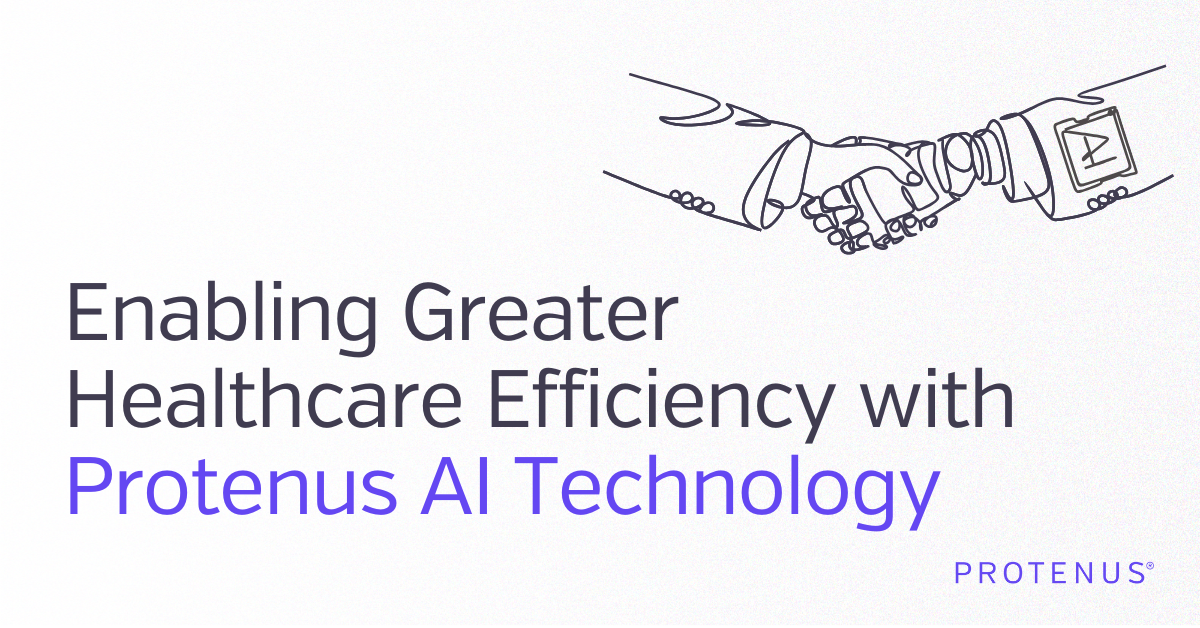Share this

Top priorities for CIOs in 2025: 3 ways to stay ahead in an uncertain environment
by Michelle Del Guercio on December 4, 2024
Chief information officers (CIO) have seen their job descriptions evolve dramatically over the past decade, encompassing more and more responsibilities across more areas of their increasingly digitized enterprises.
From spearheading cybersecurity and implementing EHR upgrades to safeguarding patient privacy and bulking up infrastructure with AI, CIOs certainly have their hands full of competing priorities – all of which must be accomplished ASAP, and often on a shoestring budget or limited resources.
But where to begin? How can CIOs develop a to-do list that tackles the most critical tasks around privacy, security, compliance, and innovation while being mindful of the limited time and resources available to them?
They can start by ensuring they are adequately addressing the top issues facing healthcare organizations across the industry while employing the strategies and leading-edge technologies to accomplish their most important goals.
As we move into 2025, which is poised to be an uncertain year of significant political, economic, and regulatory changes, here are the top 3 areas where CIOs should be focusing their efforts.
Keeping up with compliance
2025 is slated to bring some notable changes to health system operations, including the new requirement for hospitals to list their standard charges on their websites starting January 1, ongoing changes to health IT certification and information sharing protocols, and potential Congressional action on implementing new minimum standards for cybersecurity.
On top of that, CIOs must ensure that their organizations remain adherent to established regulations, such as the Health Insurance Portability and Accountability Act (HIPAA) and the Health Information Technology for Economic and Clinical Health (HITECH) Act, which present a number of complex challenges around the collection, sharing, and use of patient data in both the digital and analog environments.
Full compliance with all regulations is non-negotiable for health systems, so CIOs must focus on enhancing their organization’s culture of responsibility and awareness, often partnering with other organization stakeholders, including CISOs and Chief Compliance Officers.
What to prioritize: Adopting AI-enabled tools that can continuously monitor for violations and provide real-time alerts when problems arise will be essential for reducing the risks of legal and financial penalties while enhancing the organization’s reputation in the community.
Combating cybersecurity threats
In 2024, the Change Healthcare cyber incident rocked the industry, putting cybersecurity even higher on the CIO agenda, if possible, for 2025. With cyberattacks coming from both home and abroad, affecting both organizations themselves and their business associates (BAs), CIOs will have to be laser-focused on shoring up their defenses in the coming months.
CIOs should be particularly aware of phishing and business email compromise (BEC) attacks, which comprise the majority of successful incursions in the healthcare setting. While CIOs focus on external threats, they must also prepare for the internal threat coming from insiders that intentionally (or not) access patient sensitive information. Organizational leaders should develop a strong, multi-pronged defense plan that includes regular employee training, consistent software updates, advanced credential management, and regular recovery drills to ensure resilience after an attack occurs.
What to prioritize: To best prepare the organization, CIOs should also consider the interplay between compliance and security activities. Cyberattacks can lead to compliance breaches, and vice versa, which can compromise patient privacy and lead to penalties. Implementing comprehensive privacy policies and adopting technologies designed to protect sensitive patient data from all angles will be key to navigating the minefield of cybersecurity threats in 2025.
Leveraging the right type of AI for the right applications - and support a healthier workforce
Implementing artificial intelligence is a major goal for CIOs. In a recent survey from technology firm Arcadia, 96% of healthcare technology leaders said AI will help them gain a competitive edge. However, the same number said they feel pressure to act quickly on bringing AI to their organizations, which could lead to poor decision making if executives don’t fully understand where AI can be valuable, trustworthy, and safe for patients.
CIOs will need to develop a clear and comprehensive understanding of where AI can and should fit into their organizations. While forming AI plans and committees, CIOs should also consider how to assess third-party vendors, starting off by asking four questions of the potential vendor that may help to identify who is providing actual AI.
Many organizations are not yet ready to rely on AI for all aspects of their organization, especially for clinical diagnostics or decision support due to concerns about reliability, bias, and safety. But in the administrative arena, AI has immediate potential to solve workforce challenges and improve efficiencies.
For example, leveraging AI tools for compliance analytics can reduce the need to spend scarce people-hours on repetitive administrative tasks while aiding in overall risk reduction to the organization. By automating certain functions, AI can enable proactive monitoring around key needs, such as monitoring for patient privacy violations or staying on top of drug diversion.
What to prioritize: Healthcare CIOs need to leverage technology to improve workforce management and operational efficiency, enhance employee engagement, and reduce burnout. To maximize the value of AI solutions, CIOs should look for tools that offer operational and administrative efficiency, advanced data visualization capabilities and a platform-driven, SaaS model that eases the lift on over-burdened IT (and compliance) departments, all backed by a company that values true partnership with healthcare providers to enhance and future-proof their infrastructure.
In conclusion
2025 is likely to be a trying year for CIOs, but setting clear goals can help to keep them on the right track. A strategic and proactive approach will be important for achieving top objectives, and the right technologies will play a starring role in success for those who wish to stay one step ahead of the competition.
Working with a partner like Protenus can start the year off right with proactive, data-driven, AI-enabled solutions across multiple high priority areas, including compliance, patient privacy, and drug diversion.
By using advanced technology and strong partnerships to address the industry’s top challenges head-on, CIOs can cross the most important items off their list while preparing their organizations for a more secure, innovative, and forward-thinking future.
For more insights on how Protenus can support your organization, explore our solutions and contact us to learn more.
Share this
- December 1, 2024 (3)
- November 1, 2024 (1)
- October 1, 2024 (2)
- September 1, 2024 (1)
- August 1, 2024 (1)
- July 1, 2024 (1)
- June 1, 2024 (1)
- May 1, 2024 (1)
- March 1, 2024 (2)
- February 1, 2024 (3)
- January 1, 2024 (1)
- December 1, 2023 (1)
- November 1, 2023 (3)
- October 1, 2023 (3)
- September 1, 2023 (1)
- August 1, 2023 (1)
- July 1, 2023 (2)
- April 1, 2023 (1)
- March 1, 2023 (1)
- February 1, 2023 (1)
- December 1, 2022 (3)
- November 1, 2022 (3)
- October 1, 2022 (1)
- September 1, 2022 (1)
- August 1, 2022 (2)
- June 1, 2022 (4)
- May 1, 2022 (5)
- April 1, 2022 (1)
- March 1, 2022 (4)
- February 1, 2022 (3)
- November 1, 2021 (2)
- October 1, 2021 (3)
- September 1, 2021 (3)
- August 1, 2021 (3)
- July 1, 2021 (4)
- June 1, 2021 (2)
- May 1, 2021 (2)
- April 1, 2021 (2)
- March 1, 2021 (5)
- February 1, 2021 (1)
- January 1, 2021 (1)
- December 1, 2020 (1)
- November 1, 2020 (2)
- October 1, 2020 (2)
- September 1, 2020 (3)
- August 1, 2020 (2)
- July 1, 2020 (2)
- June 1, 2020 (6)
- May 1, 2020 (3)
- April 1, 2020 (4)
- March 1, 2020 (2)
- February 1, 2020 (4)
- January 1, 2020 (2)
- December 1, 2019 (2)
- November 1, 2019 (1)
- October 1, 2019 (1)
- September 1, 2019 (1)
- August 1, 2019 (1)
- June 1, 2019 (1)
- April 1, 2019 (1)
- February 1, 2019 (1)
- January 1, 2019 (1)
- December 1, 2018 (2)
- November 1, 2018 (2)
- October 1, 2018 (2)
- September 1, 2018 (3)
- August 1, 2018 (1)
- July 1, 2018 (2)
- June 1, 2018 (2)
- May 1, 2018 (1)
- April 1, 2018 (1)
- March 1, 2018 (2)
- February 1, 2018 (6)
- January 1, 2018 (2)
- September 1, 2017 (2)
- August 1, 2017 (2)
- June 1, 2017 (2)
- May 1, 2017 (1)
- April 1, 2017 (1)
- March 1, 2017 (2)
- February 1, 2017 (5)
- January 1, 2017 (2)
- December 1, 2016 (3)
- November 1, 2016 (5)
- October 1, 2016 (4)
- September 1, 2016 (8)
- August 1, 2016 (4)
- July 1, 2016 (4)
Subscribe by email
You May Also Like

Conserving Resources with Compliance Analytics: A 5-Step Implementation Guide

Enabling Greater Healthcare Efficiency with Protenus AI Technology

.png?width=1000&height=140&name=Bluesight%20%2B%20Protenus%20Logo%20%20(1).png)

